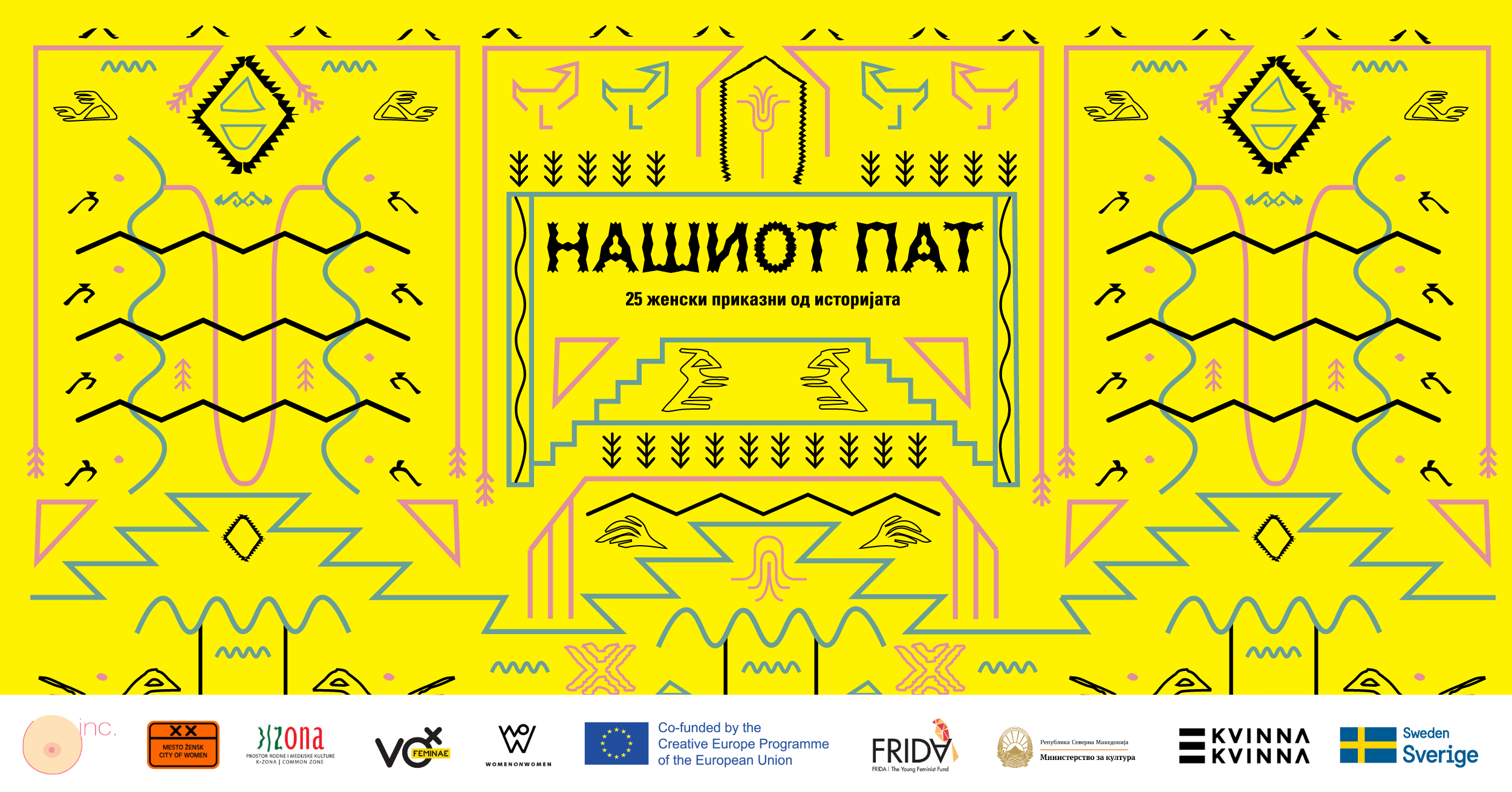
Today at 13h the promotion of the book "Our Paths: 25 Female Stories in History" will be held at Coffee-bookstore BOOKVA. Find out more about this guide of women's history.
***
What you have before you is “Our Paths: 25 Female Stories in History”, a guide not only through the geography of North Macedonia but also through the temporal narrow foot trails treaded by women who participated in its milestone historical courses. This Guide, in point of fact, takes you to 25 places of tribulations, successes, rejoicing and suffering; through villages and cities, fields and factories, schools, local neighborhoods, orphanages, hospitals, formal places and ‘no places’, places of power or powerless within the public and private sphere of our country, which we read very little about through the specifically female perspective. These women and places, as well as the stories that connect them, are not parallel or secondary narratives but are one of the two historical arteries in the heart of our present-day society, frequently left out from the history of building and tearing down of many local worlds.

“Our Paths” treats women who envisioned a better joint world and to that end actively participated in creating a military front, in sciences and in the social life; were engaged as couriers in people’s movements, as informal ministers for social justice, as partisans, politicians, writers, artists, first industrial workers, culture workers, fighters for human rights, but also as antagonistic missionaries. Viewed from the intersectional perspective, these life stories both showcase the intertwinement of the local with the global of this peripheral part of the world and at the same time challenge the institutionalized and the official narrative we have been stranded in while striving for the unattainable. In addition, the narration of these life stories in this context runs counter to the simulation brought about by the statistics of such a narrative– in which the most distinguished authors, public officials, scientists, and other people of high social capital and value are men. The lives of these women are the good side of the story about us as a community, even though the conditions they lived in were anything but good.
***
You might have read about many of the women in this Guide from other sources presenting several versions of the same biography, written sometimes long time ago and for a special occasion, and solely within the context of their main activities. Even though some of them are pivotal identity determinants for us, their lives are not accessible to the popular culture, textbooks, or other non-specific and available publications. The available official sources oftentimes project and reflect the socially customized role women should take on, predominantly, aptly squeezed into the mould of care takers and affectionate mothers, despite being successful professionals at the same time! When, however, it does not pan out like that, as it is the case with the seven women fighters – the People’s Heroes, then they are gauged in terms of presence of male prowess, and later on, if not killed in the war, they become “successful” viewed through the lens of the parameters that do not take into consideration the gender-related aspects of their private and public existence.
Thus, almost as good as never we learn about other interests, activities, grievances and joys of the protagonists; in practice, the most reliable sources yielding this kind of information are the interviews with some of these women, which have been documented. Therefore, herein we dare to offer a feminist hermeneutical frame for these 25 stories with a calculated risk that it will open up new topics, questions, even issues for a social or a more specific discussion. In brief, this is our stance: 1. Because Anitsa Savikj Rebats, Atina Boyadzi, Bilyana Garvanlieva, Vera Atseva-Dosta, Veselinka Malinska, Delfa Ivanikj, Elpida Karamandi-Bisera, Esma Redzepova, Estreya Ovadiya-Mara, Girls’ Vocational School Struga, Zahariya Vasileva Shumlyanska, Ibe Palikukja, Naming the Bridge “Rosa Plaveva and Nakie Bayram”, Yuliya Boykova Bozhinovska, Krushevo couriers from the MRO, Lila Milikj, Mara Natseva, Mimoza Nestorova-Tomikj, Olga Papesh, Olivera Yotsikj, Park “Woman Fighter”, Skopje carpet weaving workers, Editors-in-Chief of the newsletter “Makedonka”, Fana Kochovska-Petra, and Fanula Papazoglu are our feminist icons and 2. Because we deem that the values they represented should become common places both in our national history as well as local histories.

In the situation when institutions, libraries, and other places designated to preserve and reproduce knowledge have become places of oblivion and executors of epistemological injustice toward certain social groups, the local communities and memory become the counterpoint that guerrilla-like fights for its place in the politics of memory. Therefore, we would like to extend our gratitude to the anonymous local gatherers and preservers of the sources and the testimonies of interest to this publication. Of course, we would also like to acknowledge the formal systematic record keeping of this knowledge by specialized institutions, as well as the value of digital space publishing. Additionally, we would like to acknowledge all those who have made various contributions so that this publication would come into existence, as well as the whole team behind its realization, the partner organizations we initiated this enterprise with: the studio “Privaten Print” (“Private Print”) for visual solutions; the photographer Sonya Starova, who took pictures of places we could not find in the sources; the artist Hristina Ivanovska, for the revival of the hidden archive material with female stories, which, we believe, this publication will make a contribution to.
This publication was initiated in 2020 via a partner project “Women on Women” – WoW Project carried out with the sister organizations in Ljubljana (Mesto Žensk) and Zagreb (VoxFeminae) and supported by the Creative Europe Programe of the European Commission, FRIDA | Young Feminist Fund, Kvinna till Kvinna Foundation and the Ministry of Culture of the Republic of North Macedonia.
Ivana Dragshikj
Ivana Hadzievska
Yana Kotsevska













































